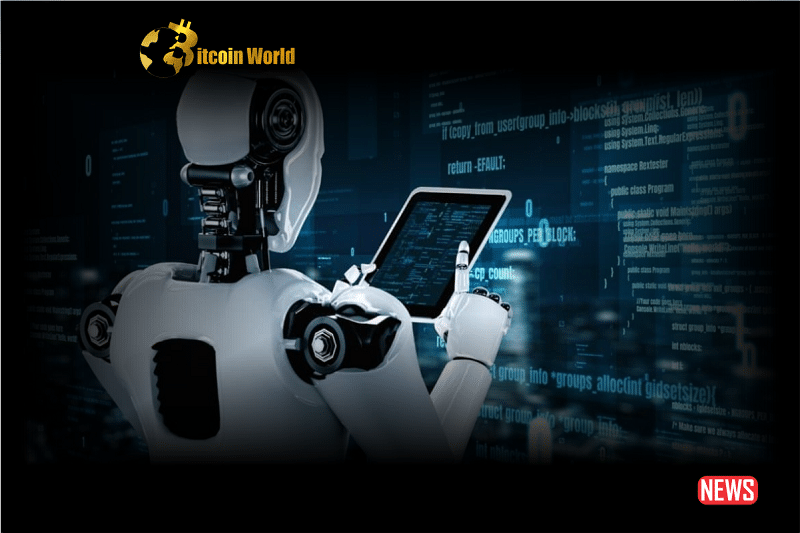The buzz around Artificial Intelligence, especially with tools like OpenAI’s ChatGPT, is undeniable. But when it comes to the intricate world of cryptocurrency and smart contracts, are we inviting more trouble than we’re solving? That’s the question being raised by security experts like Kang Li, Chief Security Officer at CertiK.
ChatGPT: A Double-Edged Sword for Smart Contract Creation?
Li, speaking at Korean Blockchain Week, voiced a critical concern: while ChatGPT can be helpful, relying on it too heavily for designing smart contracts could actually increase the number of bugs and potential attack vectors. Think about it – these contracts often handle significant financial value, so even minor flaws can have major consequences.
The Logic Bug Dilemma
One of the core issues Li highlighted is ChatGPT’s struggle with identifying logical code bugs. These aren’t your typical syntax errors; they’re flaws in the design and flow of the code that can be exploited by malicious actors. Experienced developers have a knack for spotting these nuances, but can an AI truly replicate that intuition?
Potential Pitfalls of Over-Reliance on AI
- Hidden Morphological Design Flaws: Li worries that using ChatGPT to assist in creation can introduce subtle design flaws that might not be immediately obvious but can be exploited later.
- Impact on Novice Developers: While ChatGPT lowers the barrier to entry for coding, it could hinder the learning process for beginners, masking fundamental design principles and potentially leading to insecure code.
- Increased Attack Surface: More bugs mean more opportunities for hackers to find and exploit vulnerabilities.
Where ChatGPT Shines: An AI Assistant for Experts
It’s not all doom and gloom, though. Li acknowledges that ChatGPT has significant potential as a tool for experienced engineers. Think of it as a highly efficient assistant.
ChatGPT’s Strengths in Code Analysis
- Explaining Code: ChatGPT excels at breaking down complex code, making it easier to understand the logic behind each line. This is invaluable for code analysis and reverse engineering.
- Boosting Productivity: By handling some of the more tedious aspects of code analysis, ChatGPT can free up developers to focus on higher-level tasks.
Key takeaway: ChatGPT is a powerful tool, but it shouldn’t be treated as a replacement for skilled developers, especially when building financially sensitive applications like smart contracts.
The Rising Threat of AI in Social Engineering
The conversation around AI in crypto isn’t just about development; it’s also about security threats. Richard Ma, co-founder and CEO of Quantstamp, another Web3 security firm, brought up a concerning trend: the increasing sophistication of AI-powered social engineering attacks.
How AI is Leveling Up Social Engineering
Remember those easily identifiable spam emails from years ago? Those days are fading fast. Ma points out that AI is now being used to craft incredibly convincing phishing attempts.
- Human-Like Communication: AI can generate emails and messages that are indistinguishable from those written by humans.
- Personalized Attacks: Hackers can leverage publicly available information to create highly targeted and personalized phishing attempts.
- Increased Difficulty in Detection: It’s becoming harder to tell the difference between a legitimate message and a malicious one.
Examples of AI-Driven Social Engineering
- Impersonation: AI bots can impersonate key individuals within a crypto project, making it difficult to discern genuine communication.
- Targeted Attacks: Hackers can use AI to analyze project databases and target specific individuals with tailored phishing scams.
Staying Ahead of the Curve: Defending Against AI-Powered Attacks
So, what can be done to protect against these evolving threats?
Actionable Insights for Enhanced Security
- Employee Training is Crucial: Companies need to educate their teams on the latest social engineering tactics and how to identify suspicious communication.
- Improved Anti-Phishing Software: As Ma’s mother suggests, the development of advanced anti-phishing tools is essential to filter out AI-generated malicious content.
- Healthy Skepticism: A dose of skepticism when receiving unexpected or unusual requests is always a good defense. Verify the sender’s identity through alternative channels if you have any doubts.
The Future of AI in Crypto: A Balancing Act
The integration of AI into the cryptocurrency space presents both exciting opportunities and significant challenges. While tools like ChatGPT can be valuable assistants for experienced developers and can enhance code understanding, relying on them as a primary coding solution, especially for critical smart contracts, carries considerable risk. Similarly, the increasing sophistication of AI in social engineering demands a proactive and vigilant approach to security.
As Kang Li aptly stated, it’s crucial not to depend solely on AI for coding, particularly for those new to the field aiming to build profitable ventures. The human element of expertise, critical thinking, and security awareness remains paramount in navigating this evolving landscape. The future of AI in crypto will likely be a balancing act – leveraging its strengths while mitigating its inherent risks.
Disclaimer: The information provided is not trading advice, Bitcoinworld.co.in holds no liability for any investments made based on the information provided on this page. We strongly recommend independent research and/or consultation with a qualified professional before making any investment decisions.




